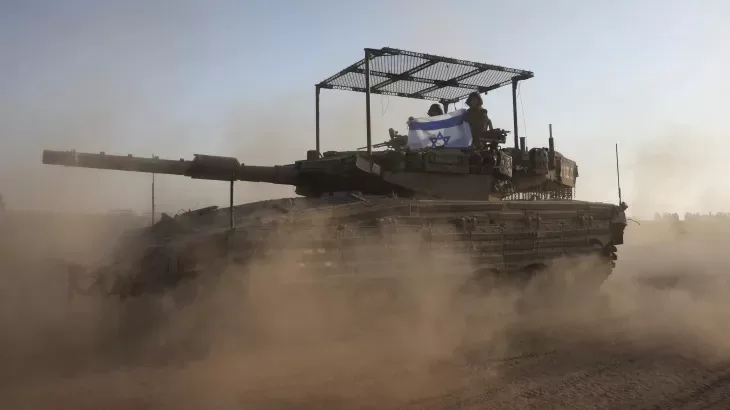- Israel’s military announces its deadliest single day for troops since the Gaza ground invasion began with 24 soldiers killed.
- Doctors Without Borders reports staff in Nasser Hospital say they can feel the “ground shaking” as Israeli bombardments close in.
- The US and the UK launch new air attacks on Houthi rebels in Yemen, hitting capital Sanaa and other areas.
- At least 25,490 people killed and 63,000 wounded in Israeli attacks on Gaza since October 7. The revised death toll in Israel from the October 7 Hamas attack stands at 1,139.
-
Israeli public so far shielded from the real cost of war
Andreas Krieg, a senior lecturer at King’s College London’s School of Security Studies, spoke to Al Jazeera about how Israelis might respond to news that their army suffered the most casualties in a single day since the Gaza ground invasion began.
Here is a summary of what he said:
- The Israeli public has so far been shielded from the real cost of this war.
- The burden of warfare has been shifted by the Israeli military onto the civilian population in Gaza.
- What we see now is that as this war is coming to a stalemate, it seems the Israeli armed forces are extremely vulnerable to targeting.
- It also shows that Hamas has not been defeated.
- A single incident such as this in a fairly small country like Israel will have quite a lot of impact on the collective psyche of Israelis and put pressure on the government to bring this war to an end and potentially accelerate negotiations.
Click here to share on social media -
Over half a million Palestinians face ‘catastrophic hunger’
The United Nations Relief Works and Agency (UNRWA) says that more than half a million people in Gaza face catastrophic hunger.
In the northern part of the besieged enclave, very little aid has reached residents and displaced families there, who have begun to grind animal feed into flour.
UNRWA pointed out that intense fighting, communications blackouts and access restrictions have hindered the organisation’s ability to “safely and effectively deliver aid”.
-
Latest on Nasser Medical Complex
The Health Ministry in Gaza has provided some updates on the situation at the Nasser Medical Complex as Khan Younis comes under intense Israeli bombardment.
It warned that the hospital’s buildings are exposed to shrapnel, which endangers the lives of patients, medical staff and displaced Palestinians.
The ministry called for an “urgent intervention” to protect both Nasser and El Amal City hospitals as well as the movement of ambulances, warning that the medical facilities were facing “extreme danger”.
 Click here to share on social media
Click here to share on social media -
Risk of having pockets of famine in Gaza remains: WFP
The UN’s food agency warns that “very little” food assistance has made it beyond the southern part of the bombarded and besieged territory since the start of the war.
“It’s difficult to get into the places where we need to get to in Gaza, especially in northern Gaza,” said Abeer Etefa, the World Food Programme’s spokesperson for the Middle East.
“The risk of having pockets of famine in Gaza is very much still there,” she added.
Etefa noted that there was a “systematic limitation on getting into the north of Gaza, not just for the WFP”.
“This is why we’re seeing people becoming more desperate and being impatient to wait for food distributions, because it’s very sporadic,” she said. “They don’t get it frequently, and they have no trust or confidence that these convoys will come again.”
-
Healthcare system in Gaza is being destroyed: MSF
Leo Cans, the head of mission for Palestine for Doctors Without Borders (Medecins Sans Frontieres, or MSF), has spoken to Al Jazeera about the state of the healthcare system in the Gaza Strip. Here is a summary:
- About 20 percent of healthcare workers are still working in the Nasser Medical Complex in Khan Younis. Most of them have had to flee because they were scared for their and their families’ lives.
- This is a strategy that has been used by the Israeli military to scare people, to terrorise the healthcare workers for them to leave without having to shut down the hospital.
- Hospitals have closed across the southern Gaza Strip, but the European Gaza Hospital in Khan Younis is still operating but is close to the front line.
- To get treatment is extremely complicated. Normally, five, six or seven operations are needed to stabilise a patient, but medical staff cannot do them now. So usually they do the first one, but then all the postoperative care is not there.
- Many patients’ conditions deteriorate during their stays in the European and Nasser hospitals, including by infection and not having the proper care.
Source:https://www.aljazeera.com/news/liveblog/2024/1/23/israels-war-on-gaza-ground-shaking-in-hospital-amid-israeli-attacks
















